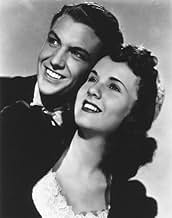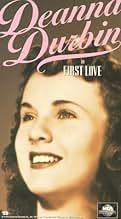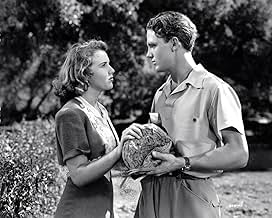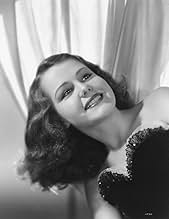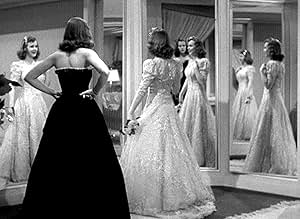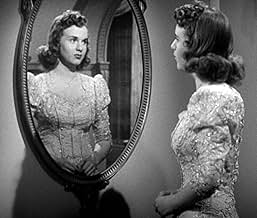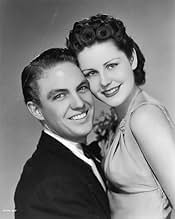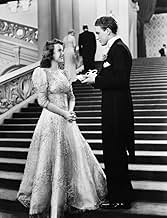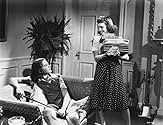Füge eine Handlung in deiner Sprache hinzuAn orphaned boarding school graduate secretly attends a prestigious ball, where she falls for the boyfriend of her snobbish cousin.An orphaned boarding school graduate secretly attends a prestigious ball, where she falls for the boyfriend of her snobbish cousin.An orphaned boarding school graduate secretly attends a prestigious ball, where she falls for the boyfriend of her snobbish cousin.
- Für 2 Oscars nominiert
- 2 Nominierungen insgesamt
Handlung
WUSSTEST DU SCHON:
- WissenswertesDeanna Durbin's character gives her birthdate as 4 December - Durbin's own.
- PatzerThe movement of Deanna during the scene with her mirror.
- Zitate
Miss Wiggins: The trouble with you young people is you don't believe in anything. You're afraid, afraid of hope, afraid of happiness.
- VerbindungenFeatured in Hers to Hold (1943)
Ausgewählte Rezension
I'll take my Cinderella with Prokovief, but after watching First Love, a first-rate film with a quease-inducing title, I'll place this Deanna Durbin vehicle second.
"You go up there to New York," says Miss Wiggins, a crotchety, spinster music teacher, to Connie Harding, who has just graduated from a fancy private school. "Make those people love you just as much as we do." Connie is an orphan, and Miss Wiggins is referring to her uncle and his family, wealthy New Yorkers who have paid all her bills but were just too busy to drive down for her graduation. They sent one of the family's limousines for her. "And then," Miss Wiggins says, "maybe, someday, you will meet a prince, and you'll live happily ever after."
"Those fairy stories haven't come true for over 100 years, Miss Wiggins," Connie says.
Miss Wiggins thumps the floor with her cane. "Fiddlesticks! We just have to dust them off...streamline them a bit."
And this is what director Henry Koster, one of the best of Durbin's directors, has managed to do. He is aided immeasurably by a clever script ("This is terrible," says Barbara, Connie's awful cousin, "I can't be more than an hour and a half late to Wilma's party...she's one of my personal friends!") and solid, pungent performances by some very good character actors. The story's sweetness is genuine, based on the intrinsic sympathy for a young girl who manages to overcome obstacles with the help of others, and then finds happiness. Deanna Durbin at 18 is an intriguing combination of naturalness and skill. We like her the moment we see her, and her ability to win us over is enhanced when we meet the family. Her uncle (Eugene Palette) is a gruff man who seemingly only wants to keep far away from his wife and children, as well as away from Connie. When we meet the rest of the family, we sympathize with him. His wife (Leatrice Joy) is unpleasantly scatter-brained. His daughter (Helen Parish), a year older than Connie, is a snobbish, selfish, manipulating terror. His son (Lewis Howard) is so languid he make laziness seem tiring.
There's a lavish ball, and Connie gets to go thanks to the intervention of the servants, led by that great butler-playing specialist, Charles Coleman. She meets a prince of a wealthy young man, Ted Drake (whom she met once before with mud on her face). When they waltz at the ball, all the other dancers fade away in a clever bit of instant love setting by Koster. Then Durbin receives her first screen kiss, from Robert Stack as Ted, as naturally as she acts. After the usual ups and downs for Cinderella, there's a happy ending which involves a matching slipper. Her uncle becomes the worm who turns, dealing brisk and satisfying retribution to his family, and even Miss Wiggins smiles. We are assured that Connie and Ted live happily ever after.
Durbin sings two or three songs, including the hoary old tear-jerker "There's No Place Like Home." More impressively, she sings "Un Bel Di." Impressively, because not many 18-year- olds I've heard of would be able to handle the emotions Puccini lays on with such a trowel. The aria is a tear-jerker, too, but a great one. It takes a singer who knows what she's doing to handle the emotions (in Italian) as well as the notes. Durbin carries it off impressively with her usual uncanny poise.
First Love, except for that title, is completely and satisfyingly charming.
"You go up there to New York," says Miss Wiggins, a crotchety, spinster music teacher, to Connie Harding, who has just graduated from a fancy private school. "Make those people love you just as much as we do." Connie is an orphan, and Miss Wiggins is referring to her uncle and his family, wealthy New Yorkers who have paid all her bills but were just too busy to drive down for her graduation. They sent one of the family's limousines for her. "And then," Miss Wiggins says, "maybe, someday, you will meet a prince, and you'll live happily ever after."
"Those fairy stories haven't come true for over 100 years, Miss Wiggins," Connie says.
Miss Wiggins thumps the floor with her cane. "Fiddlesticks! We just have to dust them off...streamline them a bit."
And this is what director Henry Koster, one of the best of Durbin's directors, has managed to do. He is aided immeasurably by a clever script ("This is terrible," says Barbara, Connie's awful cousin, "I can't be more than an hour and a half late to Wilma's party...she's one of my personal friends!") and solid, pungent performances by some very good character actors. The story's sweetness is genuine, based on the intrinsic sympathy for a young girl who manages to overcome obstacles with the help of others, and then finds happiness. Deanna Durbin at 18 is an intriguing combination of naturalness and skill. We like her the moment we see her, and her ability to win us over is enhanced when we meet the family. Her uncle (Eugene Palette) is a gruff man who seemingly only wants to keep far away from his wife and children, as well as away from Connie. When we meet the rest of the family, we sympathize with him. His wife (Leatrice Joy) is unpleasantly scatter-brained. His daughter (Helen Parish), a year older than Connie, is a snobbish, selfish, manipulating terror. His son (Lewis Howard) is so languid he make laziness seem tiring.
There's a lavish ball, and Connie gets to go thanks to the intervention of the servants, led by that great butler-playing specialist, Charles Coleman. She meets a prince of a wealthy young man, Ted Drake (whom she met once before with mud on her face). When they waltz at the ball, all the other dancers fade away in a clever bit of instant love setting by Koster. Then Durbin receives her first screen kiss, from Robert Stack as Ted, as naturally as she acts. After the usual ups and downs for Cinderella, there's a happy ending which involves a matching slipper. Her uncle becomes the worm who turns, dealing brisk and satisfying retribution to his family, and even Miss Wiggins smiles. We are assured that Connie and Ted live happily ever after.
Durbin sings two or three songs, including the hoary old tear-jerker "There's No Place Like Home." More impressively, she sings "Un Bel Di." Impressively, because not many 18-year- olds I've heard of would be able to handle the emotions Puccini lays on with such a trowel. The aria is a tear-jerker, too, but a great one. It takes a singer who knows what she's doing to handle the emotions (in Italian) as well as the notes. Durbin carries it off impressively with her usual uncanny poise.
First Love, except for that title, is completely and satisfyingly charming.
Top-Auswahl
Melde dich zum Bewerten an und greife auf die Watchlist für personalisierte Empfehlungen zu.
- How long is First Love?Powered by Alexa
Details
- Laufzeit1 Stunde 24 Minuten
- Farbe
- Seitenverhältnis
- 1.37 : 1
Zu dieser Seite beitragen
Bearbeitung vorschlagen oder fehlenden Inhalt hinzufügen


